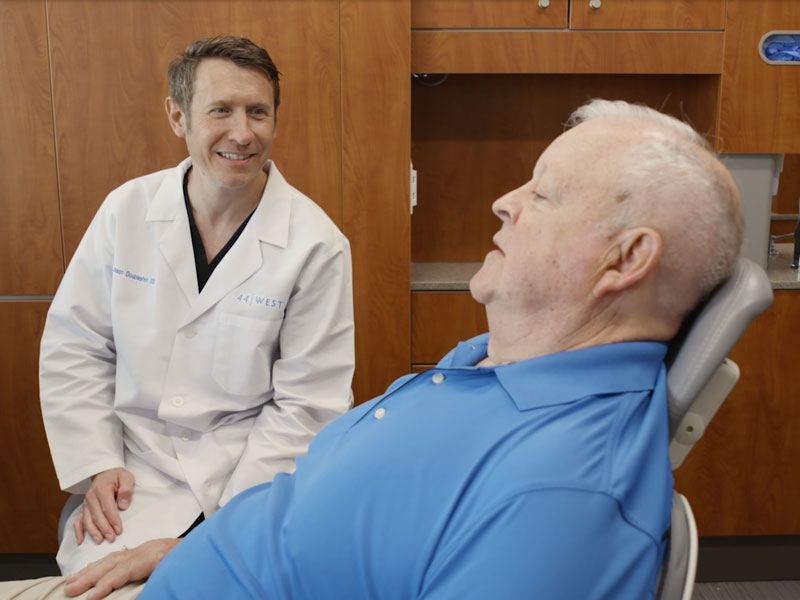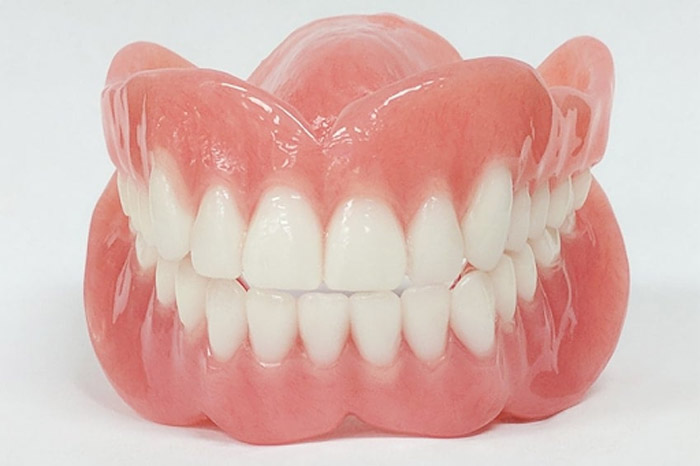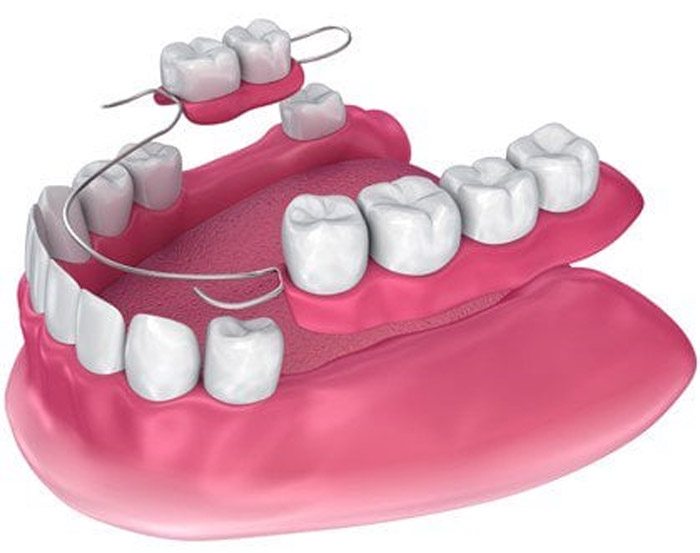Dentures

Dentures are held in place and supported by the gums, but dental implants are used increasingly today to aid in the retention and stability of dentures.
What are the Benefits of Complete Dentures?
When a patient is missing one or both arches of teeth, dentures are the quickest and least expensive way to replace teeth. Immediate dentures offer the patient an immediate tooth replacement option after tooth extraction so that the wearer does not have to go without teeth during this initial healing time.
With dentures, patients will be able to smile with confidence and chew food again.
There are three main types of complete dentures:
- Immediate Dentures: The term “immediate denture” refers to dentures that are made prior to extracting the remaining teeth. They are delivered on the same day the teeth are removed. Immediate dentures can be used in one of two ways. First, they can be used as a temporary appliance until the gums fully heal, after which time they will be replaced with a permanent set of conventional or implant-retained dentures. Alternatively, there are many cases where immediate dentures may be used as the final denture set.
- Conventional Dentures: This refers to dentures made after the teeth have all been removed or are already missing.
- Implant-Retained Dentures: When dental implants are used to help retain and support dentures, we call those “implant-retained dentures” or “implant overdentures.” Implants can be used in a number of ways to help improve the comfort and function of dentures and this is rapidly becoming the treatment of choice for most patients requiring replacement of all the teeth on one or both arches.
What are the Disadvantages of Full Dentures?
The classic downside of complete dentures is that they tend to dislodge and move around during speaking and eating. This movement may also make the gum tissues quite sore. These issues are generally worse for lower dentures than for uppers.
This might seem counterintuitive as many think lower dentures have gravity to help hold them in place. The difference here is because upper dentures cover the roof of the mouth, which provides suction to help them stay in place. Lower dentures have no suction and simply rest on top of the lower ridge. This allows them to float up during speech or chewing. Lower dentures rely on the tongue and lips to help hold them in place.
Another common complaint about dentures is that they decrease the ability to taste foods. The reason for this is that not all taste buds are on the tongue but rather there are many in other areas of the mouth as well, especially along the roof of the mouth. Dentures cover much of these areas which decrease the sense of taste and enjoyment of food.
How Can You Help My Dentures Fit Better?
Is There a Way to Make Full Dentures Stay in Place Better?
Yes! Implants are quickly becoming the standard of care for use in increasing the retention and comfort of dentures. Dental implants help by anchoring the denture in place, giving it much more rigidity and allowing the patient to chew and talk much better when compared with conventional removable dentures. There are a few different ways that implants can help retain and support dentures.
What Alternatives Are There to Complete Dentures?
In cases where all the teeth are missing from an arch, a full-arch denture is the chief method to replace the teeth. In very specialized cases, a porcelain dental bridge can be made to attach to multiple implants to replace an entire arch, though some consider this just another form of implant-retained denture. Thus the usual decision to be made is which kind of denture to provide: conventional versus implant-retained denture.
Even though these are both considered types of dentures, their design and functional abilities are very different from one another.
What is a Removable Partial Denture?
A partial denture—often simply called a “partial”—is a removable tooth replacement option for patients that are missing some but not all the teeth in an arch. A partial denture is made of prosthetic teeth and pink acrylic to match your gums.
Denture partials have features called clasps that hook to a few of the remaining teeth and help the partial stay in place. In addition to the pink gum-colored acrylic and teeth, a partial also has a framework which gives the partial its strength and provides the partial with the attachment clasps.
This framework can be made from either metal or clear resin. Most partials are made using a chrome metal framework as these tend to be thinner and stronger, but clear resin frameworks can be used in cases where metal clasps would show when the patient smiles.
Benefits of partial dentures include:
- Improved smile through the replacement of missing teeth
- Ability to replace multiple teeth with one appliance
- Since they are anchored by the remaining teeth, partials are more stable than complete dentures
- Prevent remaining teeth from shifting or moving
- Ability to modify the partial or add teeth if more teeth are lost in the future
- Relatively inexpensive when compared with other tooth replacement options
How Do Partials Compare to Other Options for Replacing Teeth?
A removable partial denture is just one option for replacing missing teeth. Other options include dental implants and bridges, and each option has its own advantages and disadvantages.
When compared with these other options, the main advantage of partials is their lesser fee. Furthermore, the fee for partials is the same whether there is one tooth being replaced or many. The disadvantage of partials when compared with these other options is that they are not quite as stable (the other two options are “fixed” where partials are “removable”) and that there is more hardware involved.
As discussed above, partials have a framework as the place that teeth attach to. This framework often takes some getting used to, as it is a different sensation than the tongue and lips are used to. Most patients do quite well getting used to the framework over time, however, and this becomes less of a concern. Teeth replaced by dental implants and bridges tend to chew and feel more like natural teeth.
A final disadvantage of partial dentures is that they rely on the remaining teeth for support. If one or more of the supporting teeth fails or needs to be removed, the fit and retention of the partial may be lessened.
Book a Consultation for Dentures
Our dentists in Grandville, Michigan, are proud to serve patients throughout Greater Grand Rapids. To schedule an appointment and learn more about your tooth replacement options, please call 44 West Dental Professionals at (616) 530-2200. You may also fill out our online contact form and someone from our team will reach out to you soon.



